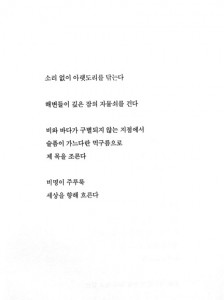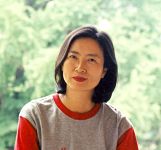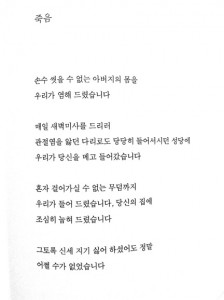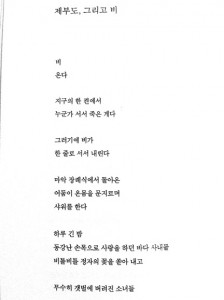Death; Jebu Island, and also Rain
We shrouded Father’s body,
which could not wash itself.
We carried you to the church
where you used to step boldly inside for mass at dawn
everyday with your arthritic legs.
We carried you all the way to the grave
you couldn’t walk to by yourself
and laid you carefully inside your home.
We couldn’t help it even though
you so hated to owe anyone.
It is
raining
Somewhere on Earth,
someone has died standing
so rain falls as a single
standing column.
Returning from the funeral service,
I shower and darkness
seeps into my entire body.
One long night,
seamen that loved the sea with cut wrists
 wobble, spilling the sperm of flowers.
wobble, spilling the sperm of flowers.
Countless abandoned girls on the shore
clean their private parts without a sound.
The seashores are locked into a deep sleep.
At the point when rain and sea are inseparable,
sadness like a string of dark clouds
strangles my neck.
Screams freely
flow out into the world.
The root of my desire to translate, which is selfish, is the same thing that keeps me from the perfect translation. Translating Kim Myung Won’s poems, I wanted to break open my own memories of South Korea for the reader: washing dishes in a bucket out on the street, jumping on trampolines over the rooftops of neon buildings, tasting squid so spicy that I shove both nostrils full of mayonnaise. But inevitably, I got in the way of myself. I fixated on the words and how I rearranged them—for my own benefit as a Korean American poet. In the end, I realized her words were only ropes. And what I needed to translate, in fact, were not the ropes themselves, but what those ropes were tied to.
Last summer, my mother introduced me to her childhood friend Kim Myung Won, who was vacationing in the States during her professorship at Daejeon University of South Korea where she taught Korean Literature. Not only did I have direct communication with Kim Myung Won throughout the translation process, my father provided insight behind meanings that I often did not recognize. For instance, it is normal in Korean culture to follow ceremonies from Shintoism at birth, Christianity at the time of marriage, and Buddhism at death. Even more, what many of my colleagues were not privy to: I was reunited just last year with my parents after eight years of separation. Translating these poems with my family was the first thing we had done together, and somehow, we vanished the distance that had been wedged between us—from both verbal communication and cultural differences.
As Jorge Luis Borges said Don Quixote “wins posthumous battles against his translators and survives each and every careless version,” I hope Kim Myung Won’s poems survive me. Rather than override her subjects with impassioned verbosity, I hope to be a vessel for them. For me, my pursuit exists in the tonal, in creating something that sticks to the ribs, and I learned that could not happen with words alone. I aimed to translate her poems less with the mind, and though it took many years to learn, more with the heart.
 Kim Myung Won is a professor of Korean Literature at Daejeon University in South Korea. She earned her BA at Ehwa Womans University in Seoul and authored several books of poetry. Contact her at
Kim Myung Won is a professor of Korean Literature at Daejeon University in South Korea. She earned her BA at Ehwa Womans University in Seoul and authored several books of poetry. Contact her at







